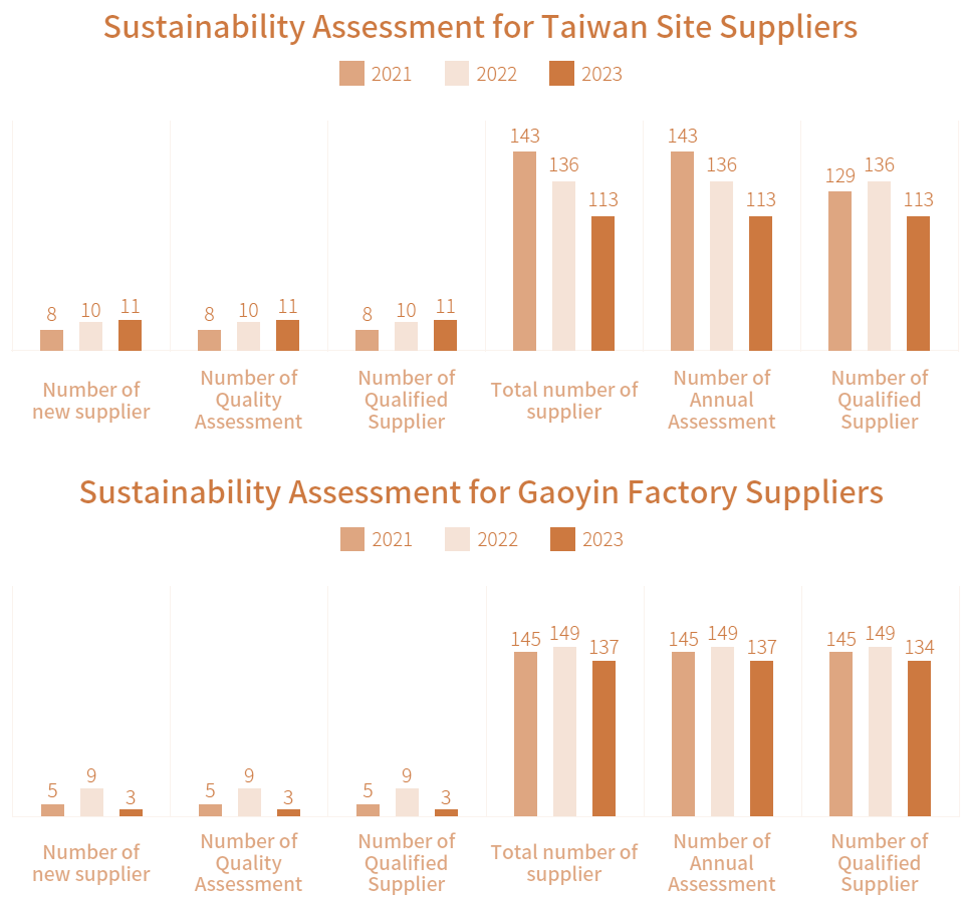
Supply Chain Policy
Our company values environmental friendliness and inclusive society, and is committed to the sustainable development of the supply chain. To ensure the safety of the working environment for suppliers, respect and dignity for their employees, business operations that promote environmental protection, and adherence to ethical conduct, we have established a “Supplier Code of Conduct” that requires suppliers to comply with. All business activities of our company’s suppliers should adhere to this code as well as the laws and regulations of the country in which they operate. This code applies to suppliers providing goods or services to our company, as well as their subsidiaries, affiliates, and contractors.
The provisions in this code are based on the “Responsible Business Alliance (RBA, formerly EICC) Code of Conduct” and refer to the “UN Guiding Principles on Business and Human Rights” and other internationally recognized human rights regulations, including the “International Labour Organization (ILO) Declaration on Fundamental Principles and Rights at Work” and the “UN Universal Declaration of Human Rights.”
This code includes five sections: Labor and Human Rights, Health and Safety, Environmental Standards, Ethical Conduct, and Management Systems.
Supply Chain Sustainability
Suppliers are key partners in SiRUBA’s value chain. In addition to providing products and services that deliver economic value to customers, we also focus on the social and environmental development of our suppliers in light of the growing global awareness of human rights and the impacts of climate change. To promote SiRUBA’s sustainable development and respond to the global environmental trend, SiRUBA has established long-term partnerships with suppliers and is actively ensuring that all suppliers comply with the social and environmental responsibilities within the supply chain. SiRUBA will continue to engage in deep communication with partners and invest in sustainable actions with upstream suppliers, aiming to collectively build a safe, friendly, environmentally responsible, and sustainable supply chain for the sewing industry.
Supply Chain Development
SiRUBA upholds the spirit of corporate citizenship to ensure a safe working environment in the supply chain, respect for labor dignity, environmental responsibility, and adherence to ethical standards. When selecting new suppliers, SiRUBA evaluates not only delivery quality, quantity, lead time, and price but also, starting in 2023, incorporates the concept of corporate sustainable development into the supply chain. Through supplier management guidelines, SiRUBA requires suppliers to meet sustainability-related standards covering areas such as environmental friendliness, occupational health and safety, labor and human rights, and ethical conduct. The long-term goal is for suppliers to align with Gaolin in advancing sustainable business practices.
Supplier Evaluation
To ensure that suppliers meet Kaulin’s requirements in terms of delivery quality, quantity, lead time, and price, SiRUBA has established the “Supplier Management Guidelines.” These guidelines include assessments and evaluations of suppliers and new vendors’ quality and delivery performance. The supplier evaluation team at SiRUBA consists of members from Quality Assurance, Production technology, Purchasing, and other departments, and works together to carry out the evaluations.
The overall supplier evaluation score is based on monthly assessments of quality and delivery performance. Suppliers are rated into four categories: A, B, C, and D. Starting from 2023, new supplier evaluations, as well as environmental and social assessments for existing suppliers, have been implemented.
Supplier Quality Evaluation Statistics
In 2021 and 2022, the focus of supplier evaluations was primarily on quality assessments. Starting from 2023, SiRUBA implemented evaluations for new suppliers as well as environmental and social assessments for existing suppliers. The evaluation results have met the company’s requirements, with no instances of supplier termination due to significant violations of environmental and social regulations.

Supplier Risk Management
To prevent suppliers from impacting company production, performance or causing disputes due to major disasters, unannounced closures, or other unforeseen circumstances, SiRUBA has established a risk assessment mechanism to enhance supplier management. SiRUBA conducts annual supplier risk
assessments, requiring suppliers to formulate contingency plans and response procedures for various potential natural or human threats, thereby ensuring uninterrupted operation and minimizing potential disruptions. This approach serves to mitigate risks to SiRUBA’s operations and safeguard the rights and
interests of stakeholders. Additionally, SiRUBA ‘s primary raw material suppliers are sourced two or more manufacturers to ensure a stable supply and reduce the risk of material shortages.
Communication of Supplier
SiRUBA places significant emphasis on maintaining effective communication with suppliers and monitoring their operational status through a range of channels. The establishment an e-Procurement information management system, allows suppliers to gain a clear understanding of SiRUBA’s current and future procurement requirements, facilitating streamlined production planning.
In response to demand, SiRUBA periodically holds supplier meetings, conferences, and participates in industry exhibitions. Additionally, the company dedicates a section on its website to suppliers, promoting strong relationships with them.
Supplier Contact Person
To promote and respond to the global environmental protection trend and the sustainable development of KAULIN MFG. CO., LTD. and establish long-term partnerships with suppliers in the supply chain, we will work together with suppliers to abide by the social responsibilities of the supply chain, including green environmental protection, labor rights, Hygiene, safety and non-toxic and other ethical norms.
If there are any supplier-related comments or issues, they can be reflected through the following channels:
Jhao Ren Chen: kevin01.chen@siruba.com

